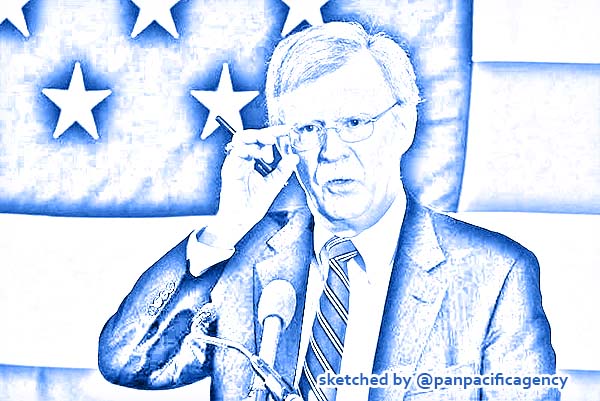Bolton memoir feared to deepen US-N. Korea distrust amid deadlock in nuke talks

“China’s recent escalation of efforts to intimidate others out of developing resources in the South China Sea is disturbing,” President Donald Trump’s national security advisor John Bolton tweeted. Darren McCollester/AFP. Sketched by the Pan Pacific Agency.
SEOUL, Jun 22, 2020, Yonhap. The memoir of former U.S. National Security Adviser John Bolton is feared to worsen distrust between the United States and North Korea amid their stalled nuclear diplomacy, as it reveals that President Donald Trump’s policy was driven by what Bolton calls “reelection calculations,” Yonhap News reported.
In his upcoming book, “The Room Where It Happened,” set to be published Tuesday (U.S. time), Bolton enumerated a series of Trump’s foreign policy decisions that he claimed were affected by the president’s pursuit of political interests.
The North has already expressed displeasure over domestic political factors getting in the way of nuclear negotiations with the U.S., accusing Washington of seeking to take advantage of dialogue to help Trump’s reelection.
“In fact, I am hard-pressed to identify any significant Trump decision during my tenure that wasn’t driven by reelection calculations,” Bolton wrote in the memoir.
Recalling the process of setting up the unprecedented encounter between Trump and North Korean leader Kim Jong-un at the inter-Korean border in June last year, Bolton criticized Trump for failing to “tell the difference between his personal interests and the country’s interests.”
“I felt sick that a stray tweet could actually result in a meeting, although I took some solace from believing that what motivated Trump was the press coverage and photo op of this unprecedented DMZ get-together, not anything substantive,” he wrote.
To Pyongyang, which has constantly impugned the sincerity of the American president’s foreign policy decisions, such revelations are not new.
But the content of the memoir could be another sobering reminder to the North that any politically driven deal with the U.S. could change or be undone with a change of government in Washington, observers said.
“The North’s misgivings about engagement with Trump could increase, as the memoir laid bare the fact that the American leader has made diplomatic moves based on political calculations,” Nam Chang-hee, professor of international politics at Inha University, said.
“I am also worried that the fact that such content was revealed by a former core security adviser — who can have behind-the-scenes, backdoor negotiations with the North in some cases — could reduce the diplomatic room for secret talks between Washington and Pyongyang,” he added.
Pyongyang has apparently been coming to grips with the nuclear talks having increasingly taken on political overtones ahead of the U.S. presidential election slated for November.
Last December, Kim Song, the North’s ambassador to the United Nations, issued a statement accusing the U.S. of seeking dialogue with Pyongyang as a “time-saving trick to suit its domestic political agenda” in an apparent allusion to the U.S. election.
That was when Pyongyang was hardening its negotiation position with a vaguely worded demand for Washington to get rid of “all obstacles” that threaten the security of his country and hamper its development
Some observers cautioned against “selection bias” in the memoir, arguing that Bolton’s memoir does not represent the full picture of what has happened in the nuclear talks between the two countries and that its impact on the bilateral ties going forward should be negligible.
Nuclear talks between the U.S. and the North have not been held since they held an unfruitful working-level session in Sweden in October.
Both the U.S. and the South have explored ways to resume talks with the North, but the efforts have faltered as the North’s nuclear issue has been overshadowed by the countries’ focus on the COVID-19 pandemic and Trump’s looming reelection battle.
Observers say that Trump may focus on “maintaining the status quo” for the time being as long as Pyongyang does not cross a red line by breaching its self-imposed moratorium on nuclear and long-range missile tests.